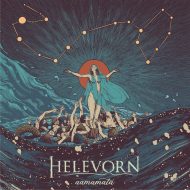 It’s been 5 years since the release of ‘Compassion Forlorn’ and the sextet from Palma de Mallorca are dedicating ‘Aamamata’ to the sea and how it surrounds them. The cover art by Gonzalo Aeneas depicts Sibyl, an Ancient Greek prophetess, singing about death for those who drown attempting to cross the Mediterranean… something of a daily occurrence at present.
It’s been 5 years since the release of ‘Compassion Forlorn’ and the sextet from Palma de Mallorca are dedicating ‘Aamamata’ to the sea and how it surrounds them. The cover art by Gonzalo Aeneas depicts Sibyl, an Ancient Greek prophetess, singing about death for those who drown attempting to cross the Mediterranean… something of a daily occurrence at present.
Xavi Gil’s drum patterns for “A Sail to Sanity” are strangely upbeat when compared to Josep Brunet’s gloomy clean vocals and the rather ethereal keyboards of Enrique Sierra, while Samuel Morales and Sandro Vizcaíno’s guitars are more expected with their solid riffs and rhythms.
The opening acoustic guitars, piano and crooned vocals on “Goodbye, Hope” give way to much heavier guitars and vocals while the twinkling of the piano remains throughout, to great effect.
Guillem Calderón’s bass pops and rumbles through the guitars and vocals while the keyboards just give a background harmony to “Blackened Waves”.
The Arabian sounding “Aurora”, with its wailing female vocals, slowly picks up its pace as the drumming gets tighter and heavier, as do the guitars to accompany the death vocals that alternate with the clean vocals and slow doomy passages.
The happy guitars on “Forgotten Fields” belie the mournful vocals, but work really well to give the song a different feel to most of the other more straight forward doom tracks on the album.
There are 8 Mediterranean languages used in “Nostrum Mare (Et deixo un pont de mar blava)”; Arabic, Catalan, French, Greek, Hebrew, Italian, Maltese and Spanish, and they are all spoken in such a way to imply a conversation is taking place while the steady drumbeat and guitars work the singing voices into the empty spaces majestically.
“Once upon a War” alternates between quietly melodic and morosely aggressive in much the same way there are lulls in any conflict.
Heike Langhans from Draconian lends her vocals to “The Path to Puya” where they complement Josep’s slight guttural rasp by being nearly too melodic and gentle, in much the same way Enrique’s background keyboards complement Samuel and Sandro’s guitars.
“La Sibil·la” an adaptation of a medieval Catalan song originally written in the 10th century [go to https://en.wikipedia.org/wiki/The_Song_of_the_Sibyl for the history lesson] and the slow haunting vocals work really well with the acoustic guitars and subtle distorted guitars that hover in the background to give the song some added depth.
A lovely doomy album that warms the cockles in this snowy weather.
(8/10 Marco Gaminara)

Leave a Reply